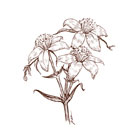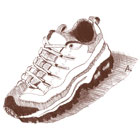Complementary and Alternative Treatments  Depression is one of the top five conditions for which people turn to complementary and alternative therapies, such as herbal treatments, exercise, relaxation or meditation exercises, and acupuncture. All of these approaches have been tested in scientific trials for depression, some with better results than others. Studies have shown that most people don’t tell their doctors what alternative therapies they’re using, but it is important to do so. Sometimes a complementary treatment has a problematic interaction with a medication your doctor is prescribing for you. Also, your doctor may be able to offer advice about that particular alternative therapy. Herbs and Supplements It wasn’t long ago that no one had heard of St. John’s wort, let alone SAMe. But now, many people are trying supplements for their depression. But before you try any treatment, be sure to ask: Does it work, and is it safe? St. John’s wort
St. John’s wort is the most popular herbal treatment for depression. However, it may be useful only when a person’s depression is not too severe. An analysis of several trials on St. John’s wort and depression published in the Annals of Internal Medicine in 2002 concluded that the herb seems effective for mild to moderate depression, working as well as the older tricyclic antidepressants such as imipramine. A three-year trial sponsored by the National Institutes of Health (NIH) and published in the Journal of the American Medical Association in 2002 found that St. John’s wort was not helpful for more serious depression. And results from studies that compare it with newer medications such as SSRIs vary widely.
The exact mechanism by which St. John’s wort works isn’t known yet, but the herb appears to raise serotonin levels, much like Prozac does. It also seems to boost two other key neurotransmitters, dopamine and norepinephrine. Whether this neurotransmitter triple-header suffices to explain the herb’s mood-lifting abilities or whether another mechanism is at work remains less clear.
One appeal of St. John’s wort is its apparently mild side effects. While some people report problems such as dry mouth, dizziness, confusion, sensitivity to sunlight, or constipation or other gastrointestinal discomforts, very few find them onerous enough to stop taking it. The proportion of those who do stop using it (roughly 2%) compares favorably with the far larger percentages of people who switch or stop taking conventional antidepressants because of side effects.
It would be a mistake, however, to regard St. John’s wort as entirely benign because it’s an herbal remedy. St. John’s wort can affect the action of quite a few drugs, including the anti-clotting drug warfarin (Coumadin), the AIDS drug indinavir (Crixivan), and birth control pills. There is a possibility, too, of bad interactions with drugs such as MAOIs and SSRIs that boost serotonin. Before taking St. John’s wort or any other natural remedy, check with your doctor or a pharmacist about potentially dangerous interactions.
A number of questions about St. John’s wort still remain. For example, it’s unclear how long its effects last or how high the depression recurrence rate is. Some of these questions may be answered by a four-year, NIH-sponsored study testing St. John’s wort against citalopram (Celexa) and a placebo in the treatment of minor depression. But until research provides more data, it may make more sense to turn to one of the many better-tested treatments for depression (see Medications Used for Depression). SAMe
Another supplement for depression that has been in the news is S-adenosyl-L-methionine (SAMe), which is made from an amino acid found in the body. A few small studies have found that it’s as effective as the older classes of medications for depression, such as tricyclics. Preliminary studies have also found that for people who do not respond fully to an SSRI, the addition of SAMe can improve response. More study is needed, and before taking SAMe in addition to an SSRI, it is safest to talk to your doctor first.
Thus far, reported side effects from SAMe have been few. One important exception is that some individuals with bipolar disorder have become manic after taking SAMe. SAMe’s most common side effects are headaches, insomnia, jitteriness, and loose stools.
Another problem with SAMe, as with many supplements, is determining the right dose. Doses used in studies have varied from 400 mg to 1,600 mg per day. It’s also expensive �?about $1 for a 200-mg tablet �?and not covered by health insurance.
SAMe has not been studied nearly as well as standard antidepressants, and more information is needed before doctors can be sure about its effectiveness and proper dose levels. Until more research is done, it’s best to opt for an antidepressant that’s been better tested. A word of caution on herbs and supplements
Because products like St. John’s wort and SAMe are classified as dietary supplements rather than drugs, they can be sold without a prescription and without FDA approval. As a result, their effects have not been scrutinized as rigorously as those of medications approved by the FDA. Also keep in mind that herbs and plants �?which may be steeped as tea, made into a tincture, used as extracts, or formulated into brand-name supplements �?can deliver widely different dosages. This variability makes herbs harder to study and renders their effects harder to predict. And even though they are marketed as "natural," they do have side effects and they may interact with other drugs you are taking. Exercise  Can a few laps around the block actually solve your emotional problems? Probably not, but a regular exercise program might help. A review of studies stretching back to 1981 concluded that regular exercise can improve mood in people with mild to moderate depression. It also may play a supporting role in treating severe depression.
Another study, published in the Archives of Internal Medicine in 1999, divided 156 men and women with depression into three groups. One group took part in an aerobic exercise program, another took the SSRI sertraline (Zoloft), and a third did both. At the 16-week mark, depression had eased in all three groups. About 60%�?0% of the people in all three groups could no longer be classed as having major depression. In fact, group scores on two rating scales of depression were essentially the same. This suggests that for those who need or wish to avoid drugs, exercise might be an acceptable substitute for antidepressants. Keep in mind, though, that the swiftest response occurred in the group taking antidepressants, and that it can be difficult to stay motivated to exercise when you’re depressed.
A follow-up to that study found that exercise’s effects lasted longer than those of antidepressants. Researchers checked in with 133 of the original patients six months after the first study ended. They found that the people who exercised regularly after completing the study, regardless of which treatment they were on originally, were less likely to relapse into depression.
A study published in 2005 found that walking fast for about 35 minutes a day five times a week or 60 minutes a day three times a week had a significant influence on mild to moderate depression symptoms. Walking fast for only 15 minutes a day five times a week or doing stretching exercises three times a week did not help as much. (These exercise lengths were calculated for someone who weighs about 150 pounds. If you weigh more, longer exercise times apply, while the opposite is true if you weigh less than 150 pounds.)
How does exercise relieve depression? For many years, experts have known that exercise enhances the action of endorphins, chemicals that circulate throughout the body. Endorphins improve natural immunity and reduce the perception of pain. They may also serve to improve mood. Another theory is that exercise stimulates the neurotransmitter norepinephrine, which may directly improve mood.
Besides lifting your mood, regular exercise offers other health benefits, such as lowering blood pressure, protecting against heart disease and cancer, and boosting self-esteem. How often or intensely you need to exercise to alleviate depression is not clear, but for general health, experts advise getting half an hour to an hour of moderate exercise, such as brisk walking, on all or most days of the week. Meditation  Meditation is a systematic method of regulating your attention, often through focusing on your breathing, a phrase, or an image. It may include calmly dismissing distracting thoughts and feelings while sitting in a relaxed position with your eyes closed. Meditation is used to relieve stress and elicit the relaxation response, a state of profound rest and release. Some experts believe that by regularly practicing techniques that evoke the relaxation response, such as meditation, you can help your body erase the cumulative effects of stress, which has been linked to health problems such as high blood pressure, heart disease, a weakened immune system, and asthma. As noted earlier, there appears to be a link between stress and depression (see Hormones and the HPA Axis). Studies have found that meditation can help prevent relapse in people who have had three or more episodes of depression. For example, in one study, while 78% of depressed people given normal treatment for depression relapsed in the following year, only 36% of those people who got meditation training in addition to regular treatment did. For people with fewer than three episodes of depression, meditation has not been found to be as effective. There is evidence that meditation has distinct effects on the brain. In one study, researchers measured brain electrical activity before, immediately after, and four months after a two-month course in mindfulness meditation. They found persistent increased activity on the left side of the prefrontal cortex, which is associated with joyful and serene emotions. Another goal of meditation is to facilitate personal change �?much the same goal as psychotherapy. Some therapists, particularly those in the cognitive behavioral field, have incorporated meditation techniques into therapy, either as part of the session or as homework for patients to do on their own. If meditation appeals to you, ask your therapist about how best to use it. Going to a class or listening to a meditation tape may be a good first step. In addition, try the meditation exercises listed below. Meditation Exercises Here is a meditation exercise that you can try on your own. - Choose a mental device to help you focus. Silently repeat a word, sound, prayer, or phrase (such as "one," "peace," "Om," or "breathing in calm"). You may close your eyes if you like, or focus your gaze on an object.
- Adopt a passive attitude. Disregard distracting thoughts or concerns about how well you’re doing. Any time your attention drifts, simply say, "Oh, well" to yourself and return to silently repeating your focus word or phrase.
- Now slowly relax your muscles, moving your attention gradually from your face to your feet. Breathe easily and naturally while using your focal device for 10 to 20 minutes. After you finish, sit quietly for a minute or so with your eyes closed. After you open your eyes, wait another minute before standing up.
- Try to practice this meditation daily for 10 to 20 minutes or longer, preferably at a specific time each day.
Have just a minute or two? Try the following quick meditation exercise to help relieve stress. - Place your hand just beneath your navel so you can feel the gentle rise and fall of your belly as you breathe. Breathe in. Pause for a count of three. Breathe out. Pause for a count of three. Continue to breathe deeply for one minute, pausing for a count of three after each inhalation and exhalation.
|
 Free Forum Hosting
Free Forum Hosting